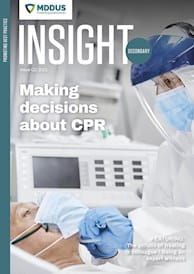 ONE of the unfortunate realities of hospital medicine, especially in the current climate, is that doctors will be very familiar with the challenges of making advance decisions around the cardiopulmonary resuscitation (CPR) of patients in the event of a cardiopulmonary arrest.
ONE of the unfortunate realities of hospital medicine, especially in the current climate, is that doctors will be very familiar with the challenges of making advance decisions around the cardiopulmonary resuscitation (CPR) of patients in the event of a cardiopulmonary arrest.
While the NHS has received deserved praise over the past year, the issue of the application of ‘Do Not Attempt Cardiopulmonary Resuscitation’ (DNACPR) decisions brought criticism early in the pandemic when it was widely reported there had been worrying variations in decision making.
It was discovered that blanket DNACPR policies were being applied to groups of people, and that some patients were not being made aware of such decisions. A special review by the Care Quality Commission (CQC) in England was undertaken, the final report of which has just been published.
This report highlights the need for greater support for clinicians in holding conversations about DNACPR as part of a holistic approach to advance care planning and also the need for a cultural shift to support patients’ decision making about what they would like to happen at the end of their lives.
DNACPR is a clinical decision that does not require consent, and you cannot be obliged to provide treatment that is not clinically appropriate. But the General Medical Council (GMC) guidance makes it clear that this is not solely a clinical decision. There should always be a presumption of patient involvement, and how to approach this is covered in detail below. If decisions are not made with regard to the correct procedural steps, you run the risk of acting in ways that are unlawful and unethical.
Remember:
- Decisions should never be made solely on the basis of factors such as age, disability, a particular medical condition, or your personal view of quality of life.
- The involvement of patients/those close to them is crucial.
- Where no confirmed decision is known, the presumption should be in favour of CPR.
- Any decision about DNACPR should be made on an individual basis, after careful assessment of the patient’s situation – never under a blanket policy.
CPR and the law
Ill-judged or hasty decisions about CPR could breach the Human Rights Act 1998, which incorporates the majority of rights set out in the European Convention on Human Rights into UK law. Specific provisions that could be relevant to DNACPR decisions include the right to life (Article 2), the right to be free from inhuman or degrading treatment (Article 3), and the right to respect for private and family life (Article 8).
Laws relating to equality and discrimination, such as the Equality Act 2010 (in England, Wales and Scotland) or the Disability Discrimination Act 1995 (in Northern Ireland) are also relevant in this context, as it may be discriminatory and unlawful if a DNACPR decision is applied to a patient on the basis of a protected characteristic such as age or disability. Care must also be taken to ensure that account is taken of these protected characteristics in terms of any impact they may have on the patient’s ability to participate in advance care planning and any special measures that might be required to facilitate such participation.
Be sure to also comply with relevant mental capacity laws, particularly those that govern:
- how to assess capacity
- how to make decisions for patients lacking capacity
- the role of those with legal powers to act on behalf of those patients.
These can also allow for legally binding refusals of CPR to be made in certain circumstances. You should respect these when they are valid and applicable to the situation at hand.
Although it is important to have an understanding of the law relating to DNACPR decisions, if you follow applicable ethical guidance and policies, you are unlikely to be acting unlawfully.
Presumption of CPR
In an emergency situation, particularly working within the constraints of the Covid-19 pandemic, you may not have sufficient time to undertake a full and adequate assessment of the patient’s situation and the likely outcome of CPR. Where no explicit decision about CPR has been made and the patient’s wishes are unknown, there should be a presumption in favour of prolonging life and giving CPR. Exceptions to the presumption of CPR may include when a patient is in the advanced stages of a terminal illness and death is imminent/unavoidable, or where there are features of irreversible death, for example rigor mortis.
There is no absolute obligation to prolong life irrespective of the consequences for the patient and irrespective of the patient’s views if they are known and can be found out.
Case-by-case decisions
You must ensure DNACPR decisions are made on the basis of the patient’s individual circumstances, and are never dictated by ‘blanket’ policies. One of the concerns investigated by the CQC was that DNACPR decisions were being applied to cohorts of people, for example all residents in a care home, or all patients over a certain age. As explained above, such decisions are likely to be unlawful and are unethical.
Clinical judgement
The GMC’s guidance on treatment and care towards the end of life sets out the need, when considering whether to attempt CPR, to consider the benefits, burdens and risks of treatment that the patient may need if CPR is successful. It acknowledges that there will be cases in which CPR might be successful, but it might still not be seen as clinically appropriate because of the likely clinical outcomes. In short, the benefits of prolonging life must be balanced against the burdens of CPR. While you must carefully consider the clinical factors, for example the likelihood of CPR being successful and the level of recovery that can be expected, there are other important factors to take into account.
Patient involvement
Another concern raised early in the pandemic was that DNACPR decisions were being put in place without informing the patient or those close to them, and sometimes were not made known until the patient was seriously unwell.
Both the GMC guidance and case law confirm that there should be a presumption in favour of discussing CPR decisions with the patient or, where they lack capacity, those close to them. Although DNACPR decisions are ultimately clinical ones, the patient’s wishes, feelings, beliefs and values in relation to its benefits and risks must be taken into account. If you judge that CPR should not be attempted, because it will not be successful, you must carefully consider whether it is necessary or appropriate to tell the patient that a DNACPR decision has been made. You must document the reason for your decision making, and be able to explain and justify it.
Your subjective views about what a patient may or may not want cannot be relied upon, regardless of your experience or perceived objectivity. The patient will be in the best position to consider the quality of their life after successful CPR, the potential indignity of CPR, and what they are willing to tolerate both during and after CPR. Those close to a patient lacking capacity often have good insights into these important aspects.
Such discussions are likely to be distressing, but this should not prevent one taking place unless you believe it would cause the patient physical or psychological harm. Failing to involve the patient without good reason could be a breach of their human rights.
Some patients may not want to be involved in CPR discussions, and their wishes must be respected. In such situations, consider seeking the patient’s permission to discuss the matter with those close to them. Whenever DNACPR decisions are discussed with those who do not hold legal powers to act on the patient’s behalf, you should be clear that theirs is an advisory role, and they are not responsible for deciding whether CPR will be of overall benefit to the patient.
When CPR will not be successful
If there is no prospect of CPR being successful, it should not be offered or attempted. This may apply where there is good reason to believe the patient is dying from an advanced, irreversible disease, or a catastrophic event from which the heart or breathing cannot be restarted for a sustained period of time. As above, there should be a presumption towards explaining the need and basis for a DNACPR decision with the patient/their representative.
If a decision not to attempt CPR is not accepted by the patient or their family (where they lack capacity), you are not obliged to agree to attempt it in the circumstances envisaged. You should explain your reasoning and any other options that may be available to the patient, including seeking a second opinion.
When CPR may be successful, but is not clinically appropriate
There will be cases where the chance of success is judged to be small but, after detailed discussion, a patient with capacity still wishes to receive CPR. In these situations the patient’s request will usually be the deciding factor. However, you are not obliged to agree to attempt CPR. If you feel unable to do so, you should explain to the patient your reasons and the option to seek a second opinion.
Where a legal proxy requests CPR but you consider the chance of success to be small, and that it would not be of overall benefit to the patient, then you are not obliged to offer CPR. Again, you should explain the options, including the right to seek a second opinion.
Key points
- CPR decisions are a clinical matter, but patient involvement is crucial.
- Decisions must be made on an individual basis, considering the relevant clinical and patient factors.
- Doctors must be aware of local and national guidance and policy on CPR decision making.
Further reading
- Treatment and care towards the end of life (GMC 2010)
- Decisions relating to cardiopulmonary resuscitation (British Medical Association, Resuscitation Council UK, Royal College of Nursing 2016)
- Do Not Attempt Cardiopulmonary Resuscitation (DNACPR) - integrated adult policy: guidance (NHS Scotland 2010)
- Protect, respect, connect – decisions about living and dying well during COVID-19 (CQC 2021)
- End-of-life care (MDDUS advice sheet)
- Decision making and consent (GMC 2020)
This page was correct at the time of publication. Any guidance is intended as general guidance for members only. If you are a member and need specific advice relating to your own circumstances, please contact one of our advisers.
Read more from this issue of Insight Secondary

Save this article
Save this article to a list of favourite articles which members can access in their account.
Save to library
